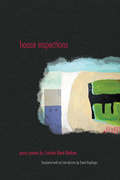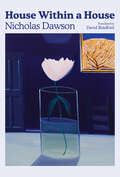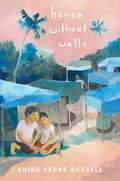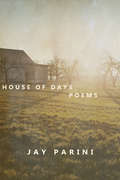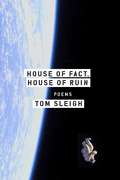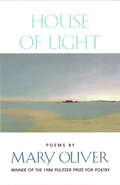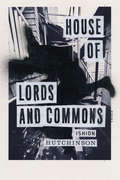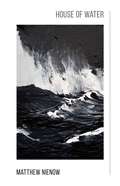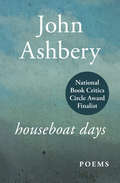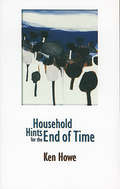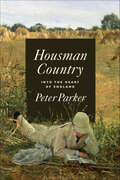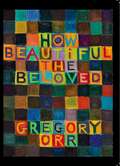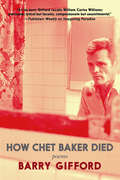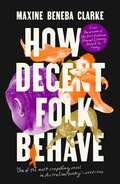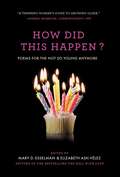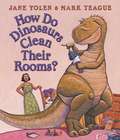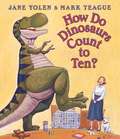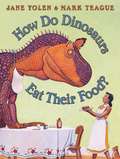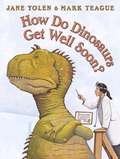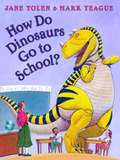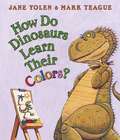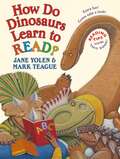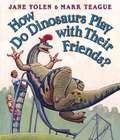- Table View
- List View
House Inspections
by David Keplinger Carsten René Nielsen"These poems do much more than blur the line between illusion and reality: they evoke that vibrant contradiction of dreaming in which the real and unreal exist in perfect simultaneity."--The Georgia Review Theatre A man performs whole days from his life as a drama, each day at home in his apartment. He goes to great lengths to be as realistic as possible, walking around the apartment and tending to day-to-day business. Only at night, when he sits by himself in the kitchen, does he peek now and then at the window to glimpse his audience. He won't completely abandon the notion that someone is out there. It's like when you stand on the landing, in front of a closed door, and you can't help thinking that someone is watching through the peephole. With a dozen poems previously published in The Paris Review, Carsten René Nielsen is already a familiar name to US poetry readers. These dark prose poems--reminiscent of Charles Simic--map out a uniquely European territory with chilling, cinematic clarity. Award-winning Danish poet Carsten René Nielsen is the author of nine books of poetry, including his US debut The World Cut Out with Crooked Scissors (2007). His poems appear in The Paris Review, Agni, Circumference, Mid-American Review, Mississippi Review, and elsewhere. He lives in Aarhus, Denmark. David Keplinger's poetry awards include the Colorado Book Award, T.S. Eliot Prize, an NEA fellowship, and grants from the Danish Arts Council. He directs the MFA program at American University in Washington, DC.
House Inspections (Lannan Translations Selection Series)
by Carsten René Nielsen"These poems do much more than blur the line between illusion and reality: they evoke that vibrant contradiction of dreaming in which the real and unreal exist in perfect simultaneity."—The Georgia Review Theatre A man performs whole days from his life as a drama, each day at home in his apartment. He goes to great lengths to be as realistic as possible, walking around the apartment and tending to day-to-day business. Only at night, when he sits by himself in the kitchen, does he peek now and then at the window to glimpse his audience. He won't completely abandon the notion that someone is out there. It's like when you stand on the landing, in front of a closed door, and you can't help thinking that someone is watching through the peephole. With a dozen poems previously published in The Paris Review, Carsten René Nielsen is already a familiar name to US poetry readers. These dark prose poems—reminiscent of Charles Simic—map out a uniquely European territory with chilling, cinematic clarity. Award-winning Danish poet Carsten René Nielsen is the author of nine books of poetry, including his US debut The World Cut Out with Crooked Scissors (2007). His poems appear in The Paris Review, Agni, Circumference, Mid-American Review, Mississippi Review, and elsewhere. He lives in Aarhus, Denmark. David Keplinger's poetry awards include the Colorado Book Award, T.S. Eliot Prize, an NEA fellowship, and grants from the Danish Arts Council. He directs the MFA program at American University in Washington, DC.
House Within a House
by Nicholas DawsonA meditation on the wiles of depression, illuminated by queer and diasporic experience. "We, nosotros, nosotras: somos sobrevivientes." Weaving prose poetry, essay, autobiography and photography in mutual contamination, Nicholas Dawson relates his own deep depression, a state never fully gone, always cohabitant. Amidst this persistence, "the body and the pen bring a plural syntax of alternative knowledges into being, one which allows us to know the world better, to know ourselves better, to better love daybreak and this sun obstinately piercing the curtain with its brazen rays." House Within a House, in a luminous translation by David Bradford, tells the story of what walls the depressed person in, what keeps them wandering inside, and what finally gets them, somehow, out of the house. The original book, Désormais, ma demeure, received the 2021 Grand Prix du livre de Montréal.
House Without Walls
by RussellFor most people, home is a place with four walls. It's a place to eat, sleep, rest, and live. For a refugee, the concept of home is ever-changing, ever-moving, ever-wavering. And often, it doesn't have any walls at all.Eleven-year-old Lam escapes from Vietnam with Dee Dee during the Vietnamese Boat People Exodus in 1979, when people from Vietnam, Laos, and Cambodia fled their homelands for safety. For a refugee, the trip is a long and perilous one, filled with dangerous encounters with pirates and greedy sailors, a lack of food and water, and even the stench of a dead body onboard. When they finally arrive at a refugee camp, Lam befriends Dao, a girl her age who becomes like a sister-a welcome glimmer of happiness after a terrifying journey. Readers will feel as close to Lam as the jade pendant she wears around her neck, sticking by her side throughout her journey as she experiences fear, crushing loss, boredom, and some small moments of joy along the way. Written in verse, this is a heartfelt story that is sure to build empathy and compassion for refugees around the world escaping oppression.
House of Days
by Jay PariniIn House of Days, his fourth collection of poems, Jay Parini moves beyond his earlier work to address the environmental and spiritual crises that afflict us in the late twentieth century. The book moves from "Nature Revisited," an elegiac sequence of poems about the ontological status of nature itself, to the title sequence, "House of Days," which might be thought of as the poet's field notes as he moves through a season, month by month. "The Ruined House," Part III, is an autobiographical sequence that revisits scenes from Anthracite Country (1982), Parini's acclaimed second volume of verse. From there, Parini moves through a series of spiritual explorations in "Another Kingdom." And in a highly inventive final sequence, "Reading Emerson in My Forty-Seventh Summer," Parini meditates on many of the great themes of Emerson--the quintessential American visionary--often blending his own language with quotations from Emerson. In all, House of Days represents a major development in the richly varied career of this hugely accomplished poet, novelist, and biographer.
House of Fact, House of Ruin: Poems
by Tom SleighTom Sleigh’s brilliant new collection is “full of the wonder and eloquence driving profound poetry” (Los Angeles Times)You’ve got to put your pants on in the house of fact.And in the house of fact, when you take off your shirt,you can hear your shirt cry out, Facts are the floor, factsare how you make the right side talk to the left.I’m washing my naked belly clean, and doing it with dignity.I’m turning around, trying to see the filthinessthat keeps making me filthy.—from “House of Fact, House of Ruin”“I hate to admit it, but even the house of fact is a house of ruin,” writes Tom Sleigh in the title sequence of this extraordinary new collection. Very much of our present moment, in which fact can so easily be manufactured and ruin so easily achieved by pressing "Send" or pulling a trigger, these poems range across the landscapes of contemporary experience. Whether a militia in Libya or a military base in Baghdad, a shantytown in East Africa or an opulent mall on Long Island, these subjects and locations resonate with the psychic and social costs of having let the genie of war, famine, and climate change out of the lamp in the first place. The book ultimately turns on conundrums of selfhood and self-estrangement in which Sleigh urges us toward a different realm, where we might achieve the freedom of spirit to step outside our own circumstances, however imperfectly, and look at ourselves as other, as unfamiliar, as strange. House of Fact, House of Ruin is Sleigh’s most engaging and virtuosic collection to date.
House of Light
by Mary OliverThis collection of poems by Mary Oliver once again invites the reader to step across the threshold of ordinary life into a world of natural and spiritual luminosity.Tell me, what is it you plan to dowith your one wild and precious life?—Mary Oliver, "The Summer Day" (one of the poems in this volume)Winner of a 1991 Christopher AwardWinner of the 1991 Boston Globe Lawrence L. Winship Book AwardThis book was published with two different covers. Customers will be shipped the book with one of the available covers.
House of Lords and Commons: Poems
by Ishion HutchinsonA stunning collection that traverses the borders of culture and time, from the 2011 winner of the PEN/Joyce Osterweil AwardIn House of Lords and Commons, the revelatory and vital new collection of poems from the winner of the 2013 Whiting Writers' Award in poetry, Ishion Hutchinson returns to the difficult beauty of the Jamaican landscape with remarkable lyric precision. Here, the poet holds his world in full focus but at an astonishing angle: from the violence of the seventeenth-century English Civil War as refracted through a mythic sea wanderer, right down to the dark interior of love.These poems arrange the contemporary continuum of home and abroad into a wonderment of cracked narrative sequences and tumultuous personae. With ears tuned to the vernacular, the collection vividly binds us to what is terrifying about happiness, loss, and the lure of the sea. House of Lords and Commons testifies to the particular courage it takes to wade unsettled, uncertain, and unfettered in the wake of our shared human experience.
House of Water
by Matthew NienowThis debut highlights fatherhood at its peak as it juggles the uncertainty and deeper meaning of everyday life. The hesitant, yet curious voice of the poems are deeply entrenched in the familial, yet also refreshingly open about the crush one feels when their ideals crash down. How does one build a life, only to be redirected and start anew?
Houseboat Days: Poems
by John AshberyIs poetry the act of putting something together, or the art of taking something apart? Houseboat Days, one of John Ashbery&’s most celebrated collections, offers its own answerRemarkable for its introspection and for the response it elicited when it was first published in 1977, Houseboat Days is Ashbery&’s much-discussed follow-up to his 1975 masterpiece Self-Portrait in a Convex Mirror, and remains one of his most studied books to date. Houseboat Days begins with the moving, unforgettable poem &“Street Musicians,&” an allegory of artistic and personal loss that came ten years after the death of Ashbery&’s friend and fellow New York poet Frank O&’Hara. But while many of the poems in Houseboat Days are strikingly personal, especially when compared to Ashbery&’s work from the 1950s and 1960s, the collection is less about the poet than about the act of writing poetry. In such widely anthologized poems as &“Wet Casements,&” &“Syringa,&” &“And Ut Pictura Poesis Is Her Name,&” and &“What Is Poetry,&” Ashbery embraces the challenge of his own ars poetica, exploring and exploding the trusses, foundations, and underground caverns that underlie the creative act, and specifically, the act of creating a poem. Marjorie Perloff of the Washington Post Book World called Houseboat Days &“the most exciting, most original book of poems to have appeared in the 1970s.&”
Household Hints for the End of Time
by Ken HoweWinner of the 2001 Anne Szumigalski Award for Poetry and shortlisted for the 2001 Regina Book Award (Saskatchewan Book Awards). Shortlisted for the 2002 Gerald Lampert Award and longlisted for the 2002 ReLit Awards. A wide-ranging reckless intelligence, verbal audacity and irrepressible humour -- all these combine with a large-hearted embrace of existence in Ken Howe's poems. Whether they are observing, with fine ironic wit, the vagaries of domestic life, elegizing lost ones, or raised in celebration of musical compositions, they remind us of the need to address the world with all our faculties alert, including a language alive with its native energy and luminosity.
Housman Country: Into the Heart of England
by Peter Parker“Parker’s beautiful Housman Country tells you everything you want to know about the life and influence of England’s most satirised but inimitable poets.” —Evening StandardA New York Times Book Review Editor’s ChoiceNominated for the 2017 PEN/Bograd Weld Prize for BiographyA. E. Housman’s A Shropshire Lad made little impression when it was first published in 1896 but has since become one of the best-loved volumes of poetry in the English language. Its evocation of the English countryside, thwarted love, and a yearning for things lost is as potent today as it was more than a century ago, and the book has never been out of print.In Housman Country, Peter Parker explores the lives of A. E. Housman and his most famous book, and in doing so shows how A Shropshire Lad has permeated English life and culture since its publication. The poems were taken to war by soldiers who wanted to carry England in their pockets, were adapted by composers trying to create a new kind of English music, and have influenced poetry, fiction, music, and drama right up to the present day. Everyone has a personal “land of lost content” with “blue remembered hills,” and Housman has been a tangible and far-reaching presence in a startling range of work, from the war poets and Ralph Vaughan Williams to Inspector Morse and Morrissey.Housman Country is a vivid exploration of England and Englishness, in which Parker maps out terrain that is as historical and emotional as it is topographical.“[A] rich blend of literary criticism and cultural history.” —The Spectator
How Beautiful the Beloved
by Gregory Orr"[A] confident, mystical, expansive project."--Publishers Weekly"[D]azzling and timeless . . . focus is so unwaveringly aimed toward the transcendent--not God, but the beloved--that we seem to slip into a less cluttered time."--The Virginia Quarterly Review, "Editor's Choice""Mary Oliver calls him '...a Walt Whitman without an inch of Whitman's bunting or oratory.' In these pages, he is more nearly a modern-day Rumi. This is not primarily a poetry of image, but of ideas, perfectly distilled. Orr brings together the monumental themes of love and loss in small, spare, and exquisite koan-like poems."--ForeWord"...magnetic poems that open the world of lyrical verse to the larger questions of what is true and timeless." --The Bloomsbury ReviewGregory Orr continues his acclaimed project on the "beloved" with a lyrical sequence about the joys and hungers of being fully engaged in life. Through concise, perfectly formed poems, he wakes us to the ecstatic possibilities of recognizing and risking love. Mary Oliver has called this project "gorgeous," and said that he "speaks of the events that have no larger or more important rival in our lives--of our love and our loving."If to say it onceAnd once only, then stillTo say: Yes.And say it complete,Say it as if the wordFilled the whole momentWith its absolute saying.Later for "but," Later for "if."NowOnly the single syllableThat is the beloved.That is the world.Gregory Orr is the author of ten books of poetry. He teaches at the University of Virginia and lives in Charlottesville.
How Chet Baker Died: Poems
by Barry GiffordPoems from the acclaimed author of Roy&’s World, Wild at Heart, and many other works The first words in Barry Gifford&’s new poetry collection say it all—&“Here I am wasting time again / writing poems to keep myself company&” — doing what he has ever done, surprising his readers in kaleidoscopic prisms of color, turning every breath into a story, and himself into his most colorful character. She stood and walked across the lawnpast the cottage and into the big house.He stayed to watch the last of the sunset,waiting for the flash of green.When it was finally dark and there wasno moon and the fireflies appeared,he got up and began walking toward the house.He loved the Italian word for firefly,lucciola. She was like that, flickeringon and off from moment to moment.As he approached the house, he could hearher singing: Vogliatemi bene, un bene piccolino. It&’s so strange, he thought,life&’s so fast and time&’s too slow.He stopped and watched the fireflies. Or this: In my dream someone asked me ifI remembered Frank JacksonHearing this name brought tearsto my eyes though I&’ve neverknown anyone by that name The mystery in these poems lives just beyond the province of words. In a strange way, Barry Gifford&’s poems tell a wordless story, freed of the writer&’s art. &“It&’s dangerous to remember / so much, especially for a writer / The temptation to make sense / of it is always there / where you and I / are no longer.&” Daily life, family and friends, are much more important here than books. The beauty and elusiveness of women and music are of utmost importance, far more so than literature. As he attests: &“I prefer music to poems, words don&’tlive the same way—so, listen.&”
How Decent Folk Behave
by Maxine Beneba Clarkewe are all just one small disasteraway from sinking, and sometimes you only realisewhen you're gasping for airOn a daylight street in Minneapolis Minnesota, a Black man is asphyxiated - by callous knee of an officer, by cruel might of state, and under crushing weight of colony. In Melbourne the body of another woman has been found - this time, after catching a late tram home.The Atlantic has run out of the English alphabet, when christening hurricanes this season. The earth is on fire - from the redwoods of California, to Australia's east coast. The sea draws back, and tsunamis lash out in Samoa and Sumatra. Water rises in Sulawesi and Nagasaki. Bloated cod are surfacing, all along the Murray Darling.The virus arrives, and the virus thrives. Authorities seal the public housing towers up, and truck in one cop to every five residents. Notre Dame is ablaze - the cathedral spire blackened, and teetering.Out in Biloela, the deportation vans have arrived. Every Friday, in cities all across the world, children are walking out of school. The wolves are circling. The wolves are circling.These poems speak of the world that is, and sing for a world that may one day be.'One of the most compelling voices in Australian poetry this decade' Overland Literary Journal'a powerful and fearless storyteller' Dave Eggers'Readers are left with the sense they have been seen, heard and understood' Books + Publishing
How Did This Happen?: Poems for the Not So Young Anymore
by Mary D. Esselman Elizabeth Ash VelezFrom the bestselling authors of The Hell with Love, a fierce, funny, touching collection that takes the sting out of "aging while female."
How Do Dinosaurs Clean Their Rooms?
by Jane Yolen Mark TeagueThe bestselling, award-winning team of Yolen and Teague present their second original dinosaur board book, a playful "how-to" tale about making a mess and then cleaning it up. Come along for some BIG fun as your favorite dinosaurs learn to pick up and put away their toys. How do dinosaurs clean their rooms? With trash cans and dusters and brooms! Brimming with the same infectious humor as the other HOW DO DINOSAURS tales, this new board book is a perfect companion to the immensely popular picture books and a great baby gift as well. Image descriptions present
How Do Dinosaurs Count to Ten?
by Jane Yolen Mark TeagueCome along for some BIG fun as your favorite dinosaurs delight young readers with their playful antics. How do dinosaurs count to ten? Over and over and over again! Image descriptions present
How Do Dinosaurs Eat Their Food?
by Jane YolenThese terrible lizards have correspondingly terrible table manners; they burp, hurl spaghetti, and gleefully shove green beans up a giant reptilian nostril. Subsequent scenes of dinos "sit[ting] quite still" and beaming with "smiles and goodwill" offer examples of correct behavior; but even the mealtime "don'ts" offer useful information in hand-painted labels identifying each kaleidoscopically patterned creature. Don't miss queztalcoatus screeching at a restaurant waitress, or upersaurus inspecting his nutritious supper Kids will chortle over clever images of adults dwarfed by toothy miscreants, and both parents and children will recognize the hilarious parallels with occasionally naughty human kids who loom dinosaur-large within their respective households.
How Do Dinosaurs Get Well Soon?
by Jane YolenWhat if a dinosaur catches the flu? Does he whimper and whine between each "At-choo"? Does he drop dirty tissues all over the floor? Does he fling his medicine out of the door? Just like kids, little dinosaurs hate being sick. And going to the doctor can be pretty scary. How DO dinosaurs get well soon? They drink lots of juice, and they get lots of rest; they're good at the doctor's, 'cause doctors know best. From enormous sneezes to gigantic wails, the outrageous antics of the mischievous young dinosaurs in this book are sure to bring laughter to anyone who has ever said "Atchoo!"
How Do Dinosaurs Go to School?
by Jane YolenWhat would you do if a very large ceratosaurus stomped into your classroom? And what if the student sitting next to you was a gigantic silvisaurus -- who decided to jump on top of his desk? Come along for a very unusual day where dinosaur show-and-tell, story time, and recess antics will make even the best-behaved young dinosaurs laugh aloud. School has never been so much fun!
How Do Dinosaurs Learn Their Colors?
by Jane YolenThe bestselling, award-winning team of Yolen and Teague present their third original dinosaur board book, a fun read-aloud that teaches children all the colors of the rainbow.
How Do Dinosaurs Learn to Read
by Jane YolenAmerica's favorite dinosaurs romp and roar as they soak books in the bathtub, throw them, and finally learn how to carefully read them... with Mama and Papa at bedtime. Get ready to laugh at this lighthearted, heartwarming, and funny approach to books! Children sometimes feel the task of learning to read is overwhelming, but the winning combination of rhyme and illustrations here provide a perfect way to present the subject in a comical, engaging, and nonjudgmental way. The contrast of enormous dinosaurs in kid-sized bedrooms (with human parents) adds irresistible humor as families explore the do's and don'ts of reading. Both practical and engaging, this book shows dinosaurs getting into all sorts of reading-related trouble! But of course, in the end, the dinosaurs learn how to carefully handle their books, read out loud, and read a lot!
How Do Dinosaurs Play with Their Friends?
by Jane Yolen Mark TeagueCome along for some BIG fun as your favorite dinosaurs delight young readers with their playful antics.
How Do Dinosaurs Say Good Night?
by Jane YolenIn each playful spread of this read-aloud bedtime book, parents are ready to put their kids to bed-but these youngsters just happen to be dinosaurs! And though they may stomp and slam their tails a bit, in the end they act a lot like people-they give a big kiss, turn out the light, and whisper "good night".
